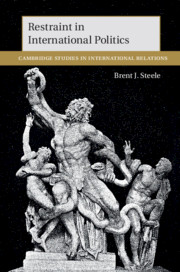Book contents
- Restraint in International Politics
- Cambridge Studies in International Relations: 151
- Restraint in International Politics
- Copyright page
- Dedication
- Contents
- Figures and Tables
- Acknowledgments
- Introduction
- 1 Restraint Appraised
- 2 Restraint and Actionism in Global Politics
- 3 The Historical (Ab)uses of Restraint
- 4 Democratic Restraint, Democratic Libido
- 5 Restraint, Anti-Climax, and Insecurity
- 6 Restraining Those Who Can’t Restrain Themselves
- Conclusion: Towards a Strategic Narrative of Restraint
- References
- Index
- Cambridge Studies in International Relations
5 - Restraint, Anti-Climax, and Insecurity
Published online by Cambridge University Press: 25 October 2019
- Restraint in International Politics
- Cambridge Studies in International Relations: 151
- Restraint in International Politics
- Copyright page
- Dedication
- Contents
- Figures and Tables
- Acknowledgments
- Introduction
- 1 Restraint Appraised
- 2 Restraint and Actionism in Global Politics
- 3 The Historical (Ab)uses of Restraint
- 4 Democratic Restraint, Democratic Libido
- 5 Restraint, Anti-Climax, and Insecurity
- 6 Restraining Those Who Can’t Restrain Themselves
- Conclusion: Towards a Strategic Narrative of Restraint
- References
- Index
- Cambridge Studies in International Relations
Summary
The chapter explores restraint in the context of security. It examines two cases where restraint proved difficult or even unsatisfying: (1) the 2013 US decision to avoid military action against Syria following the latter’s 2013 chemical weapons attack and (2) the 2014 ISIS beheadings that drew the USA into a limited use of military strikes against that transnational terrorist organization. It also applies the complexes to different Islamic movements over time. It concludes via ontological security and securitization with the reasons restraint appears to be so unsatisfying in the context of security policies.
Information
- Type
- Chapter
- Information
- Restraint in International Politics , pp. 174 - 204Publisher: Cambridge University PressPrint publication year: 2019
